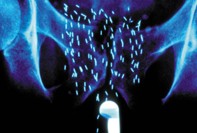Peer Reviewed
Feature Article Men’s health
Localised prostate cancer: questions patients ask
Abstract
The general population is now relatively well informed about prostate cancer. In fact, there is so much literature in the public domain on prostate cancer that it can be difficult to keep ahead of our patients. This article tackles some of the common questions
general practitioners are faced with on a day-to-day basis and gives the evidence to support the answers.
Key Points
- There is now good evidence to support dietary changes that may reduce the risk of developing prostate cancer. These changes include reducing fat intake; taking selenium, lycopene and vitamin E supplements; and avoiding excess calcium.
- The aim of modern prostate cancer diagnosis is to use all the available information to ensure that only those patients with a significant cancer undergo biopsy.
- Not all patients with prostate cancer need treatment, and there are now useful nomograms to help determine those who really need treatment and those who can be actively surveyed.
- There are so-called ‘ideal patients’ for the different modalities of treatment. This helps in the guidance of patients to the best treatment for them.
Purchase the PDF version of this article
Already a subscriber? Login here.

